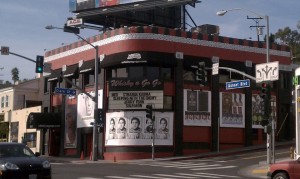Though I no longer smoke or eat the kind of food they served, I’m feeling nostalgic about the days of old when you could sit in any of the dim, dank coffee shops in the local Bickford’s chain for hours, hanging out, chain smoking and drinking those awful, bottomless cups of black coffee.
I blame The Doors for this trip down memory lane. I’ve been listening to their first album this morning and when “Soul Kitchen” came on, the lyrics transported me back.
Well, your fingers weave quick minarets
Speak in secret alphabets
I light another cigarette
Learn to forget, learn to forget
Learn to forget, learn to forget
Let me sleep all night in your soul kitchen
Warm my mind near your gentle stove
Turn me out and I’ll wander baby
Stumblin’ in the neon groves
Well the clock says it’s time to close now
I know I have to go now
I really want to stay here
All night, all night, all night
It makes sense that I was going through the Jim Morrison phase in those days. I used to sit at the table for hours and hours, with friends or alone, tearing through a pack of Marlboro Reds and filling notebooks with song lyrics, bad poetry and, occasionally, an essay I had to write for school.
I had two favorites: A Bickford’s in Swampscott and another in Lynnfield, right off Route 1 North at the Peabody line. The latter location is now a pretty good Greek restaurant. The former is now an Uno’s Pizza restaurant.
The food at Bickford’s was pretty bad, too. But it always hit the spot for a 20-something kid who had just spent the night drinking, smoking marijuana or both. I would often end up at one of these places at 5 in the morning after a late night. We would order the junkiest breakfast food they had, drink the coffee, smoke and be generally obnoxious. But everyone else was usually there under the same circumstances, so we fit right in.
On Tuesday afternoons, me and a couple friends would sit in the Swampscott shop laughing at how we were the only people there under the age of 76. Tuesday afternoons was when they had the senior citizen dinner specials.
It always puzzled me that they would eat there, since the food quality was no better than what you would find in any given nursing home. I felt the same way about the old-timers who would flock to a place on Route 1, Saugus called the Hilltop Steakhouse. The food there was a little better than Bickford’s, but not too much better.
Here’s where we get to the big point of this post.
When we’re in our 30s, 40s and 50s, I think we go through a long phase of food snobbery where only the more sophisticated bistros will do. But when your very young or up there in age, all that really matters is the change of scenery and hanging out with friends and significant others.
Of course, we live in a much different world now. Smoking is almost universally banned. Restaurants kick you out if you don’t buy something.
True, you can sit in Starbucks for hours nursing the same coffee and not be bothered, but that’s different. Starbucks has a cleaner, more comfortable environment, and the food and drinks cost more than it used to cost at Bickford’s.
Meanwhile, the food is usually steeped in some “artisan” concept. The quality ain’t much better, but the packaging is a lot more slick than, say, Bickford’s corned beef hash.
I love that Starbucks has so many blends and roasts to choose from, though I sometimes laugh over how they over do it with their seasonal and holiday blends.
You have the Christmas Blend, Thanksgiving Blend, etc. They could go on with this shtick indefinitely, with a “Good Friday Blend” that has no taste or color, in keeping with the Christian obligation to fast. Or they could do a “Back To School Blend” with traces of speed in the mix to jolt students back into the studious frame of mind.
I’ll tell you what, though: It was far cheaper and efficient to get back into studying when you could make pennies for bottomless coffee and smoke your way through assignments.
Those are happy memories, but today’s scenario is a better fit for who I am.
I don’t smoke anymore. I’m sober. I don’t eat flour or sugar. I sleep at night and work by day.
It’s good to have the memories, though.

















